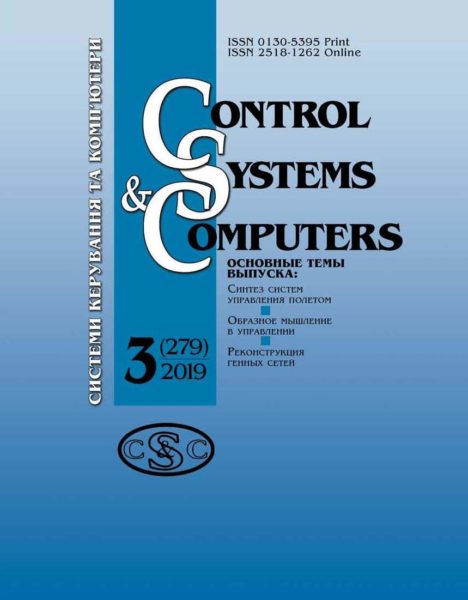Control Systems and Computers, N4, 2016, Article 2
DOI: https://doi.org/10.15407/usim.2016.04.016
Upr. sist. maš., 2016, Issue 4 (264), pp. 16-26.
UDC 65.011.56
Timashova Liana A., Doctor of Eng. Sciences, Head of the department, International Research and Training Center for Information Technologies and Systems NAS and MES of Ukraine, Glushkov ave., 40, Kyiv, 03187, Ukraine, E-mail: dep190@irtc.org.ua
Intellectualization Problems of Solving Modeling and Control Tasks for Production Processes
Methods. Existing computer-aided facilities are not always ready for the high-quality solving of the management problems, that are different from traditional problems in an algorithmic way. The intelligent modeling aids can be such a tool.
Purpose. The approaches for the intelligent modeling include the use of both classic mathematical methods (fuzzy sets, multiagent systems, genetic algorithms and methods) and development of models for mentation as the main function of human intelligence. The classic methods mentioned above work efficiently under conditions of uncertainty of the management processes.
A concept version for the intelligent modeling systems realization to make the executive production decisions is proposed. The simulation and artificial intelligence technologies are united. The simulation technologies proved to be efficient for the certain classes of day-to-day management problems. Artificial intelligence deals with the development of the systems based on knowledges.
Such systems include both knowledges necessary for qualified research for the simulation of the corresponding classes objects and knowledges of the personnel management that makes management decisions. Thus, the limits of simulation application methods extend considerably because the end-users of these systems should not have any special knowledge in the field of programming and simulation anymore.
Conclusion. The results of this research can be used as a theoretical and methodological base by the enterprises managers, scientific bodies in the process of research and realization of the approaches for management of enterprises to control the innovation processes, to teach students and post-graduate students.
Keywords: virtual systems, virtual enterprises, information technologies, intelligent control systems.
- Gritsenko, V.I., Timashova, L.A., 2014. “Tekhnologii prinyatiya resheniy v usloviyakh sistem intellektual’nogo upravleniya biznesom”. Materialy shk.-sem.” Perspektyvni tekhnolohiyi pryynyattya rishen v umovakh system intelektualnoho upravlinnya biznesom”, Zhukyn, 30 cher. 5 lyp. 2014 r., Kyiv, pp. 4–14. http://www.irtc.org.ua/Inform/190_2014.pdf. (In Russian).
- Meytus, V.YU., 2014. “Problemy sozdaniya intellektual’nykh sistem upravleniya proizvodstvom”. Materialy shk.-sem.” Perspektyvni tekhnolohiyi pryynyattya rishen v umovakh system intelektualnoho upravlinnya biznesom”, Zhukyn, 30 cher. 5 lyp. 2014 r., Kyiv, pp. 15–30. (In Russian).
- Pospelov, D.A., 1989. Modelirovaniye rassuzhdeniy. Opyt analiza myslitel’nykh aktov. M.: Radio i svyaz’, 184 p. (In Russian).
- Moroz, O.H., Stepashko, V.V., 2015. “Ohlyad hibrydnykh struktur MHUA-podibnykh neyronykh merezh ta henetychnykh alhorytmiv”. Induktyvne modelyuvannya skladnykh system. K.: MNNTS IT ta S., 7, pp. 173–191. (In Ukrainian).
- L.A. Timashova, L.P. Tur, V.A. Leshchenko et. al., 2008. “Intellektual’nyye tekhnologii v sistemakh upravleniya predpriyatiyami”. Materialy KHV mezhdunar. konf. po avtomaticheskomu upravleniyu “Avtomatika–2008” Odessa: ONMA, pp. 597–601. http://auto2008.onma.edu.ua /dl/program.doc> (In Russian).
- Kapitonova, Yu.V., Skurikhin, V.I., 1999. “O nekotorykh tendentsiyakh razvitiya i problemakh iskusstvennogo intellekta”. Kibernetika i sistem. analiz, 1, pp. 43–50. (In Russian).
- Leshchenko, V.A., 2010. “Ontologicheskiy podkhod k postroyeniyu intellektual’nykh resheniy”. Intelektualni systemy pryynyattya rishen ta problemy obchyslyuvalʹnoho intelektu (ISDMCI’2010): Materialy Mizhnar. nauk. konf., Kherson: KHNTU, pp. 266–268. (In Russian).
- L.A. Timashova, L.P. Tur, V.A. Leshchenko et. al., 2012. “Postroyeniye situatsionnykh resheniy s ispol’zovaniyem znaniy”. Materialy KHIKH mizhnar. konf. z avtomatychnoho upravlinnya “Avtomatyka – 2012”. K:. NUKHT, pp. 445–446. (In Russian).
- Tur, L.P., Leshchenko, V.A., Timashova, L.A., 2014. “Ispol’zovaniye formal’nykh modeley dlya predstavleniya znaniy v sistemakh podderzhki prinyatiya logisticheskikh resheniy”. Materialy shk.-sem.” Perspektyvni tekhnolohiyi pryynyattya rishen v umovakh system intelektualnoho upravlinnya biznesom”, Zhukyn, 30 cher. 5 lyp. 2014 r., Kyiv, 215 p. http://www.irtc.org.ua/Inform/190_2014.pdf (In Russian).
- L.A. Timashova, L.P. Tur, V.A. Leshchenko et. al., 2009. “Modeli proyektirovaniya i upravleniya logistikoy virtual’nogo predpriyatiya”. K .: IRTC ITandS NASU, 115 p. (In Russian).
- L.P. Tur, L.A. Timashova, V.A. Leshchenko et. al., 2011. “Postroyeniye situatsionnykh logisticheskikh resheniy v ontologicheskom prostranstve intellektual’nykh sistem upravleniya predpriyatiyem”. Materialy 1-y mezhdunar. nauch.-tekhn. konf., Cherkassy, 10 – 13 maya 2011 g. Cherkassy: Maklaut, pp. 389–390. (In Russian).
- Leshchenko, V.A., Morozova, A.I., 2011. “Primeneniye ob”yektno-strukturnogo podkhoda dlya postroyeniya polya znaniy intellektual’noy sistemy upravleniya proizvodstvom mashinostroitel’nogo predpriyatiya”. Materialy 1 mizhnar. nauk.-tekhn. konf. “Obchislyuvalniy intelekt” (OI-2011), Cherkasy, 10 –13 trav., pp. 332–333. (In Russian).
- V.A. Leshchenko, A.I. Morozova, L.YU. Taran et. al., 2015. “Tekhnologiya izvlecheniya znaniy, oriyentirovannaya na obraznoye predstavleniye tsekhovogo upravleniya”. Materialy III mezhdunar. konf. “Vychislitel’nyy intellekt: rezul’taty, problemy, perspektivy”, ConInt– 2015, Kiyev, Cherkassy. 12–15 maya 2015 g., Cherkassy, 2 p. (In Russian).
- L.A. Tymashova, L.A. Bondar, V.A. Leshchenko et. al., 2005. “Informatsiyni systemy dlya suchasnykh biznes-analitykiv”. K.: APSV, 483 p. (In Ukrainian).
-
L.A. Timashova, A.I. Morozova, V.A. Leshchenko et. al., 2015. “Modeli izvlecheniya i strukturirovaniya znaniy”. Índuktivne modelyuvannya skladnikh sistem. K .: IRTC ITandS NASU, 7, pp. 240–258. (In Russian).
-
V.V. Fedoseyev, A.N. Garmash, D.M. Dayitbegov et. al., 1999. Ekonomiko-matematicheskiye metody i prikladnyye modeli: Ucheb. posobiye. M.: YUNITI, 391 p. (In Russian).



